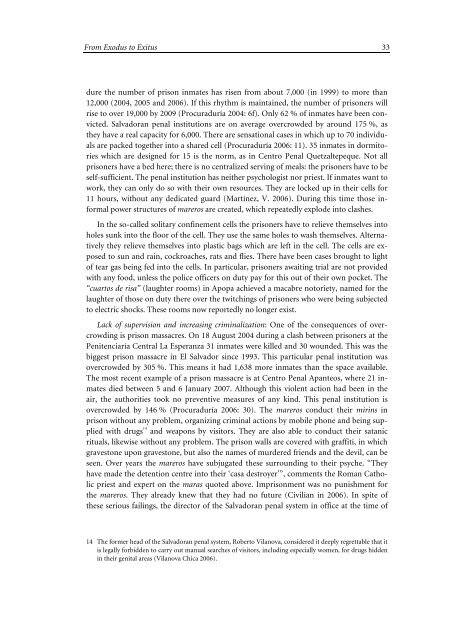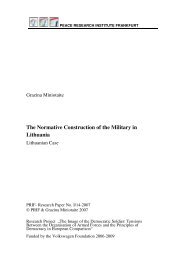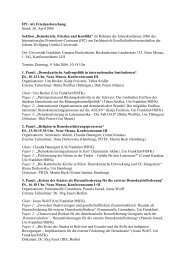From Exodus to Exitus Causes of post-war violence in El ... - eDoc
From Exodus to Exitus Causes of post-war violence in El ... - eDoc
From Exodus to Exitus Causes of post-war violence in El ... - eDoc
You also want an ePaper? Increase the reach of your titles
YUMPU automatically turns print PDFs into web optimized ePapers that Google loves.
<strong>From</strong> <strong>Exodus</strong> <strong>to</strong> <strong>Exitus</strong> 33<br />
dure the number <strong>of</strong> prison <strong>in</strong>mates has risen from about 7,000 (<strong>in</strong> 1999) <strong>to</strong> more than<br />
12,000 (2004, 2005 and 2006). If this rhythm is ma<strong>in</strong>ta<strong>in</strong>ed, the number <strong>of</strong> prisoners will<br />
rise <strong>to</strong> over 19,000 by 2009 (Procuraduría 2004: 6f). Only 62 % <strong>of</strong> <strong>in</strong>mates have been convicted.<br />
Salvadoran penal <strong>in</strong>stitutions are on average overcrowded by around 175 %, as<br />
they have a real capacity for 6,000. There are sensational cases <strong>in</strong> which up <strong>to</strong> 70 <strong>in</strong>dividuals<br />
are packed <strong>to</strong>gether <strong>in</strong><strong>to</strong> a shared cell (Procuraduría 2006: 11). 35 <strong>in</strong>mates <strong>in</strong> dormi<strong>to</strong>ries<br />
which are designed for 15 is the norm, as <strong>in</strong> Centro Penal Quetzaltepeque. Not all<br />
prisoners have a bed here; there is no centralized serv<strong>in</strong>g <strong>of</strong> meals: the prisoners have <strong>to</strong> be<br />
self-sufficient. The penal <strong>in</strong>stitution has neither psychologist nor priest. If <strong>in</strong>mates want <strong>to</strong><br />
work, they can only do so with their own resources. They are locked up <strong>in</strong> their cells for<br />
11 hours, without any dedicated guard (Martínez, V. 2006). Dur<strong>in</strong>g this time those <strong>in</strong>formal<br />
power structures <strong>of</strong> mareros are created, which repeatedly explode <strong>in</strong><strong>to</strong> clashes.<br />
In the so-called solitary conf<strong>in</strong>ement cells the prisoners have <strong>to</strong> relieve themselves <strong>in</strong><strong>to</strong><br />
holes sunk <strong>in</strong><strong>to</strong> the floor <strong>of</strong> the cell. They use the same holes <strong>to</strong> wash themselves. Alternatively<br />
they relieve themselves <strong>in</strong><strong>to</strong> plastic bags which are left <strong>in</strong> the cell. The cells are exposed<br />
<strong>to</strong> sun and ra<strong>in</strong>, cockroaches, rats and flies. There have been cases brought <strong>to</strong> light<br />
<strong>of</strong> tear gas be<strong>in</strong>g fed <strong>in</strong><strong>to</strong> the cells. In particular, prisoners await<strong>in</strong>g trial are not provided<br />
with any food, unless the police <strong>of</strong>ficers on duty pay for this out <strong>of</strong> their own pocket. The<br />
“cuar<strong>to</strong>s de risa” (laughter rooms) <strong>in</strong> Apopa achieved a macabre no<strong>to</strong>riety, named for the<br />
laughter <strong>of</strong> those on duty there over the twitch<strong>in</strong>gs <strong>of</strong> prisoners who were be<strong>in</strong>g subjected<br />
<strong>to</strong> electric shocks. These rooms now reportedly no longer exist.<br />
Lack <strong>of</strong> supervision and <strong>in</strong>creas<strong>in</strong>g crim<strong>in</strong>alization: One <strong>of</strong> the consequences <strong>of</strong> overcrowd<strong>in</strong>g<br />
is prison massacres. On 18 August 2004 dur<strong>in</strong>g a clash between prisoners at the<br />
Penitenciaría Central La Esperanza 31 <strong>in</strong>mates were killed and 30 wounded. This was the<br />
biggest prison massacre <strong>in</strong> <strong>El</strong> Salvador s<strong>in</strong>ce 1993. This particular penal <strong>in</strong>stitution was<br />
overcrowded by 305 %. This means it had 1,638 more <strong>in</strong>mates than the space available.<br />
The most recent example <strong>of</strong> a prison massacre is at Centro Penal Apanteos, where 21 <strong>in</strong>mates<br />
died between 5 and 6 January 2007. Although this violent action had been <strong>in</strong> the<br />
air, the authorities <strong>to</strong>ok no preventive measures <strong>of</strong> any k<strong>in</strong>d. This penal <strong>in</strong>stitution is<br />
overcrowded by 146 % (Procuraduría 2006: 30). The mareros conduct their mir<strong>in</strong>s <strong>in</strong><br />
prison without any problem, organiz<strong>in</strong>g crim<strong>in</strong>al actions by mobile phone and be<strong>in</strong>g supplied<br />
with drugs 14 and weapons by visi<strong>to</strong>rs. They are also able <strong>to</strong> conduct their satanic<br />
rituals, likewise without any problem. The prison walls are covered with graffiti, <strong>in</strong> which<br />
graves<strong>to</strong>ne upon graves<strong>to</strong>ne, but also the names <strong>of</strong> murdered friends and the devil, can be<br />
seen. Over years the mareros have subjugated these surround<strong>in</strong>g <strong>to</strong> their psyche. “They<br />
have made the detention centre <strong>in</strong><strong>to</strong> their ‘casa destroyer’”, comments the Roman Catholic<br />
priest and expert on the maras quoted above. Imprisonment was no punishment for<br />
the mareros. They already knew that they had no future (Civilian <strong>in</strong> 2006). In spite <strong>of</strong><br />
these serious fail<strong>in</strong>gs, the direc<strong>to</strong>r <strong>of</strong> the Salvadoran penal system <strong>in</strong> <strong>of</strong>fice at the time <strong>of</strong><br />
14 The former head <strong>of</strong> the Salvadoran penal system, Rober<strong>to</strong> Vilanova, considered it deeply regrettable that it<br />
is legally forbidden <strong>to</strong> carry out manual searches <strong>of</strong> visi<strong>to</strong>rs, <strong>in</strong>clud<strong>in</strong>g especially women, for drugs hidden<br />
<strong>in</strong> their genital areas (Vilanova Chica 2006).












